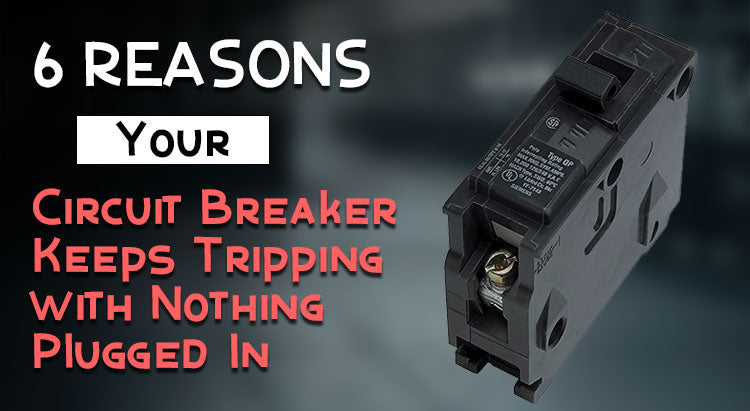6 Reasons Your Circuit Breaker Keeps Tripping with Nothing Plugged In

No one likes dealing with a tripped circuit breaker, but usually, it’s just a mild annoyance.
The solution is simple.
You unplug the responsible device(s) and reset the breaker.
Then, everything goes back to normal.
However, if your circuit breaker keeps tripping with nothing plugged in, it can be tough to keep your cool.
Fortunately, the reality of the situation is fairly straightforward.
Once you understand it, you’ll have an easy time restoring your circuit breaker to normal operation.
Why Does My Breaker Keep Tripping with Nothing Plugged In?
Electrical circuit breakers are essential for maintaining the safety and functionality of our electrical systems.
Their purpose is to interrupt the flow of electricity when there is an overload or fault in the circuit. However, it can be baffling and frustrating when a circuit breaker repeatedly trips without any apparent cause, even when no appliances or devices are connected.
Let's discuss potential reasons behind a circuit breaker tripping with nothing plugged in and provide potential solutions.
Here’s the truth: it’s very unlikely that your circuit breaker keeps tripping with nothing plugged in. Unless your building or home has had the electricity completely cut off from it, there is always some amount of load on your breaker.
Troubleshooting a Circuit Breaker that Keeps Tripping with Nothing Plugged In
Let’s look at some possibilities that could be behind your circuit breaker tripping even though nothing is plugged in.
1. Overloaded Circuit
One possible explanation for a circuit breaker repeatedly tripping despite no devices being connected is an overloaded circuit.
Each circuit has a specific capacity, measured in amps, that it can handle. If the combined power demand of all the devices on a circuit exceeds its capacity, the circuit breaker will trip as a protective measure.
To address this issue, it is crucial to assess the number and types of appliances sharing the circuit and redistribute the load accordingly.
2. Something Actually Is Plugged In
While you’ve probably already checked for this a million times, make sure that nothing could be tripping the breaker that you haven’t considered.
You might have a device plugged in outside or in the garage where you’ve forgotten all about it. Maybe there’s a device in another room that you don’t think is on the same breaker.
One way to check for this is to use an electronic circuit breaker finder to map out which outlets are connected to which breakers.
If you don’t want to make that kind of investment, just do a quick check and consider unplugging some devices in the surrounding area just to see if they were actually connected to the breaker in question.
3. A Damaged Input Wire or Faulty Wire
Another potential cause of a circuit breaker tripping without any devices plugged in is faulty wiring.
If you’re sure you’ve checked that first box, the next suspect is a damaged input wire or faulty wire that is causing current leakage. This problem could be dangerous if it wasn’t for your trusty circuit breaker constantly tripping to keep you safe.
Over time, electrical wiring can deteriorate due to wear and tear or other factors. Loose connections, damaged insulation, or short circuits can generate excess heat, increasing the likelihood of tripping the circuit breaker.
Of course, that doesn’t make it any less annoying.
You’ll need an electrician to come out and chase down the source of the leakage in order to fix it. This isn’t the type of weekend project most people are equipped for in terms of both the expertise and equipment required.
4. Ground Faults
Ground faults occur when the hot wire in an electrical circuit comes into contact with a grounded surface, such as a metal conduit or the grounding wire itself.
Ground faults can cause a circuit breaker to trip, even in the absence of connected devices.
To troubleshoot this issue, it is important to check for damaged wiring, faulty outlets, or improper grounding.
If a ground fault is suspected, consulting an electrician for a thorough examination and appropriate repairs is advisable.
5. Circuit Breaker Malfunction
Finally, you may need to replace your circuit breaker.
In certain instances, the problem may lie with the circuit breaker itself.
Over time, circuit breakers can wear out or become defective, resulting in false trips.
Factors like dust accumulation, excessive heat, or internal component failures can contribute to circuit breaker malfunction.
If there are suspicions of a faulty breaker, seeking guidance from a professional electrician to test, replace, or upgrade the circuit breaker is recommended.
6. Other Factors
Additional factors may contribute to circuit breaker trips, even when no devices are plugged in.
These factors could include:
- power surges
- external environmental conditions (e.g., lightning strikes)
- faulty appliances connected to other circuits in the same electrical panel
In such situations, further investigation is necessary, and the assistance of an electrician should be sought to diagnose and address the underlying issue.
Fixing Your Circuit Breaker So It Quits Tripping with Nothing Pugged In
Encountering a circuit breaker that keeps tripping with nothing plugged in can be perplexing and inconvenient. However, by considering potential causes such as overloaded circuits, faulty wiring, ground faults, circuit breaker malfunctions, or external factors, you can initiate troubleshooting and resolve the problem.
Provided you checked for devices that could be responsible, hopefully, you now have a better understanding of why your circuit breaker keeps tripping with nothing plugged in.
Always remember that electrical work can be hazardous, so it is best to consult a professional electrician to ensure the safety and integrity of your electrical system.
At least by troubleshooting first, you won’t be paying them for nothing. It also shouldn’t take them too long to root out the source of the constant tripping and fix it.




